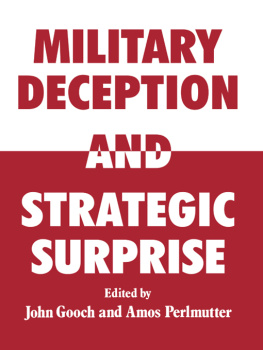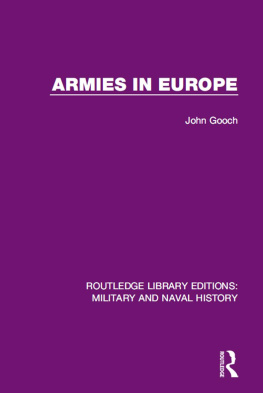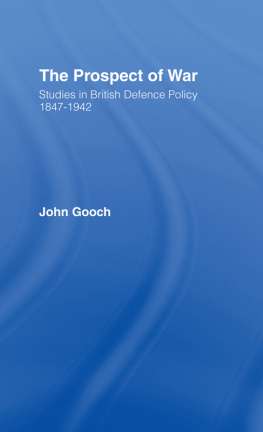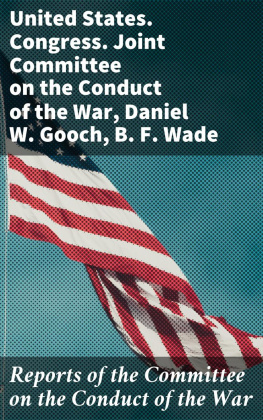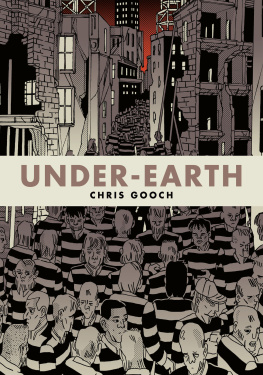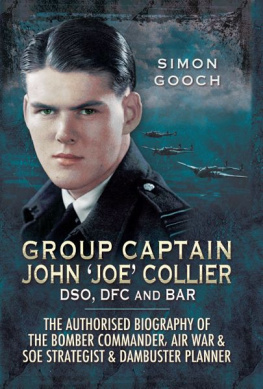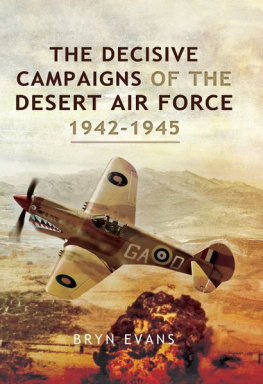DECISIVE CAMPAIGNS OF THE
SECOND WORLD WAR
DECISIVE CAMPAIGNS
OF THE
SECOND WORLD WAR
Edited by
JOHN GOOCH
First published 1990 in Great Britain by
FRANK CASS AND COMPANY LIMITED
Reprinted 2004
by Frank Cass
2 Park Square, Milton Park, Abingdon, Oxon, OX 14 4RN
Transferred to Digital Printing 2005
Frank Cass is an imprint of the Taylor & Francis Group
Copyright 1990 Frank Cass & Co. Ltd.
British Library Cataloguing in Publication Data
Decisive campaigns of the Second World War.
1. World War 2. Army operations
I. Gooch, John II. Journal of strategic studies, ISSN
0140-2390
940.5412
ISBN 0-7146-3369-0
ISBN 0-7146-4070 0 (pbk)
This group of studies first appeared in a Special Issue on Decisive Campaigns of the Second World War of The Journal of Strategic Studies Vol. 13, No.l published by Frank Cass & Co. Ltd.
All rights reserved. No part of this publication may be reproduced, stored in a retrieval system, or transmitted in any form, or by any means, electronic, mechanical, photocopying, recording, or otherwise, without the prior permission of the publisher.
CONTENTS
NOTES ON CONTRIBUTORS
John Gooch is Professor of History at the University of Lancaster and co-editor of this journal. Among his recently published works are Army, State and Society in Italy, 18601915 (Macmillan, 1989) and Military Misfortunes: The Anatomy of Failure in War (with Eliot A. Cohen) (The Free Press, 1990).
Martin S. Alexander is a lecturer in modern French and British history at the University of Southampton. Educated at Oxford University and at the Universit de Paris IV (Sorbonne), he has held a Research Fellowship of the Franco-British Council and was a John M. Olin visiting postdoctoral fellow at Yale in 198889. He is co-editor (with Helen Graham) of The French and Spanish Popular Fronts: Comparative Perspectives (Cambridge University Press, 1989), and joint general editor (with AJ. Nicholls) of the Longman series The Post-War World: Studies in Contemporary History. A contributor to Peter Paret's new edition of Makers of Modern Strategy (Princeton University Press, 1986), he is currently completing a study of General Gamelin, The Republic in Danger, 19331940, to be published by Cambridge University Press.
Marc Milner has served as an historian with the Canadian Department of National Defence, where he contributed to the official histories of the RCAD and RCN in the Second World War. The author of numerous publications on the Atlantic War, including North Atlantic Run: The RCN and the Battle for the Convoys, he has taught military history at the University of New Brunswick since 1986, and is presently Director of UNBs Military and Strategic Studies Program.
Malcolm Smith is a Senior Lecturer in History at St. David's University. He is the author of British Air Strategy between the Wars (Oxford University Press, 1984), British Politics, Society and the State (Macmillan, 1990), and co-author of Cinema, Literature and Society: Elite and Mass Culture in lnterwar Britain (Croom Helm 1987). He is currently writing 1940: The Great British Myth for Routledge.
Lucio Ceva was born in Milan, where he practised law between 1952 and 1987. He has published a large number of books, essays and articles on military history, as well as having presented numerous conference papers. Among his main publications are Una battaglia partigiana (1966), La condotta italiana della guerra (1975), Le Forze Armate (1981) and Africa Settentrionale 19401943 (1982). He teaches the history of military institutions at the University of Pavia, where he has been associate professor since 1987.
Bernd Wegner was educated at the Universities of Tubingen, Vienna and Hamburg, where he took his Ph.D. in 1980. He was a Research Fellow at St. Antony's College, Oxford, in 197980 and since then has been a fellow of the Militrgeschichtliches Forschungsamt and a part-time lecturer at Freiburg University. His publications include The Waffen-SS (Blackwell, 1990) and a study on the German-Russian war in 194243, which will appear later this year as part of Das Deutsche Reich und der Zweite Weltkrieg, vol.6 (Stuttgart: Deutsche Verlagsanstalt).
Brian Holden Reid is Lecturer in War Studies, King's College, London, and since 1987 has been Resident Historian at the British Army Staff College, Camberley the first civilian to work on the Directing Staff for over 100 years. A fellow of the Royal Historical Society and Royal Geographical Society, from 198487 he was Editor of the RUSI Journal. He is the author of/.F.C. Fuller: Military Thinker (1987) and co-editor of The British Army and the Operational Level of War (1989) and New Technology and the Arms Race (1989) and numerous essays on British and American military history
Louis Allen became Reader in French at the University of Durham, where is now Honorary Fellow of the Northumbrian Universities East Asia Centre. A wartime intelligence officer in South-East Asia, he is the author of many books and articles on Japan and Asia, including Japan: The Years of Triumph, Sittang the Last Battle, Singapore 19411942, The End of the War in Asia, and Burma: The Longest War, and is at present working on a book on Japanese intelligence.
Decisive Campaigns of the Second
World War
Introduction
JOHN GOOCH
Important battles, Clausewitz tells us, are the gold and silver of the strategic budget. Writing in the shadow of Napoleon and greatly influenced by an era in warfare when it had become fairly common for the outcome of a campaign to be decided by a single battle, it was natural that he should hold such a view: contemporary history supported it, and it accorded with the central place occupied by combat in his theory of war. Indeed, it is scarcely possible to study Napoleon's campaigns without recognising that a single decisive battle which could decide the outcome of an entire campaign was generally the Emperor's goal and that he often attained it.
Characteristically, Clausewitz pointed out that a decisive battle was not simply a very large engagement or one which ended in a clear victory for one of the parties involved but that it also depended on other factors, particularly the extent to which both parties had committed the major part of their strength to the duel.
Though the decisive battle remained a goal of the German armies during the first three years of the Second World War, on the whole it was not one shared by their opponents. Instead the Allies sought to crush Germany, and then Japan, by exerting overwhelming pressure on them in many places and over an extended period of time. After 1941 Germany was forced to respond in kind as the operational virtuosity of the Wehrmacht proved unable to shatter opponents who could mobilise and employ superior resources on a global scale. Japan, inherently much weaker than Germany, succumbed like her Axis partner to the cumulative blows of an opponent who never committed the major part of his strength to a single duel.
France did fall victim to the German armies in only 45 days, to be sure, and Japan was finally brought to her knees largely through the use of two atomic weapons; but for the major combatants Great Britain, Russia and the United States on the one hand, and Germany, Italy and Japan on the other the outcome of the Second World War was not determined by any single decisive battle. Nevertheless the lure of such a glamorous quarry has attracted some military historians, though the wiser heads have acknowledged that at best a number of battles can be so described and that no single engagement can receive the laurels as truly decisive.




